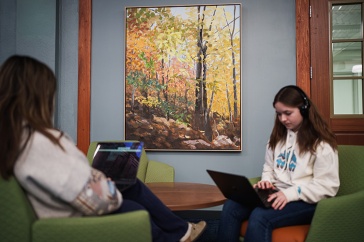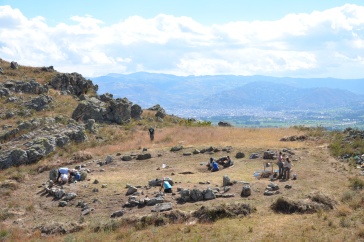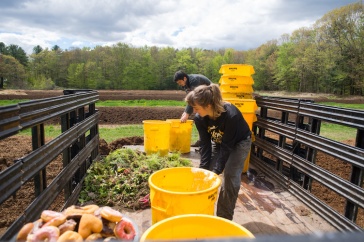
Open mic nights. long a staple at the Freedom Café, continue in the new location. (Courtesy photo)
The Freedom Café was founded more than eight years ago with one ambitious goal and two worldly possessions.
A 2011 service trip to Nepal with a team of UNH students inspired Bryan Bessette to create an outlet to help fight back against – and ultimately aim to end – human trafficking. A little more than two years later, the café opened its doors with that mission.
And little else.
“We started with a simple coffee maker and a donation bin,” Bessette, co-founder and president of the café, says.
That coffee maker has long since been replaced by much shinier, newer equipment. But the donation box – the very same small, utilitarian box, with the word “donation” painted in black on a rough wooden surface – remains. It’s recently taken up residence alongside the cash register at the café’s new location in the former Scammell Grange Hall at 37 Main Street in Durham.
The Freedom Café moved from its original location at 10 Mill Road in June, giving Bessette and team the opportunity to settle into a more central location and expand its offerings. The move is a tangible representation of the café’s success and growth, and the donation bin is an equally tangible throwback to its humble beginnings.
“I think what I love is the synergy between the old and the new, the fact that there are artifacts from our initial space” Bessette says. “This new location offers a very appealing environment while also sort of stretching back and connecting to the energy and love that was brought to the old space.”
Bessette similarly hopes to transport – and continue building upon – positive results. The café, which operates on a suggested donation model where a recommended price is set and customers can pay more or less at their discretion, has routinely made between $3,000 and $5,000 above suggested donation prices annually.
  |
| The front counter at the Freedom Café's new location. (Courtesy photo) |
All proceeds go to causes that help fight human trafficking and the commercial exploitation of people. In its eight years of existence, the café has donated $63,000.
The newer, more visible location is expected to bring an increase in foot traffic, particularly once the school year begins. Bessette said he hopes to serve between 100 and 150 drinks per day in the new spot, compared to about 40 per day in the previous location.
“It’s been an experiment the whole time,” he says. “I hope the experiment continues to work well as we engage a much broader audience. We’re not set up to pump out a thousand drinks a day, but we’re seeking to offer a quick experience to those who want that. But quick and meaningful.”
Meaningful interactions are what the Freedom Café prides itself on. New customers unaware of the café’s mission are greeted with a quick description and encouraged to ask questions. The café hosts numerous community events, including weekly open mic nights, during which additional information about the scope of human trafficking and what the café and community are doing to address it, is shared.
Several customers have gone on to become much more than just regulars, inspired by the café’s mission. Sharissa Stout ’17, ’21G attended an open mic night with her roommate as a UNH freshman in 2013 and had something “stirred within me to get involved and be a part of the movement against modern-day slavery.”
That year, she raised money for the cause while home for Christmas break and later switched her major from nutrition to social work. She volunteered at the café, carving out roles as fundraising coordinator and community outreach coordinator, and went on to be hired as a social worker by Waypoint (formerly Child & Family Services of New Hampshire) as part of a federal grant through the New Hampshire Human Trafficking Collaborative Task Force to work as part of a human trafficking response program providing direct victim services to survivors.
Having returned to UNH and graduated this May with a Master of Social Work degree, her goal is to become licensed as a clinical social worker and get involved in substance use treatment.
“The café played a huge role for me. It provided a creative outlet, and it also tugs on the strings of your heart and brings out a passion in you as a person if you are really moved by social justice causes,” Stout says. “I wouldn’t have become a social worker if it weren’t for the Freedom Café and its cause.”
Having a connection to UNH has long been important to Bessette, a former campus chaplain. Students are frequent performers at open mic nights, and the café has partnered with student groups and residence halls on programming. The communications department has used the space for end-of-semester presentations, and the Socratic Society has met there on Friday afternoons for more than four years.
Discussions sparked by community gatherings have ballooned to include as many as 60 people and have occasionally ventured into controversial topics, including one such panel discussion that included debate on decriminalizing prostitution and sex work.
“We stand at the edge of a university, and we are in a learning environment,” Bessette says. “If there are subjects or ideas that can’t be discussed in public, then how do we learn? We have to be able to hear all sides of an idea to make informed decisions. This is a place where people can express their ideas and opinions in a safe space and hopefully cultivate listening and understanding.”
-
Written By:
Keith Testa | UNH Marketing | keith.testa@unh.edu
















































